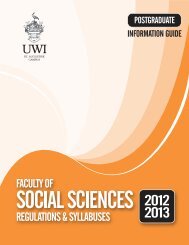Faculty of Humanities and Education (Postgraduate) - The University ...
Faculty of Humanities and Education (Postgraduate) - The University ...
Faculty of Humanities and Education (Postgraduate) - The University ...
Create successful ePaper yourself
Turn your PDF publications into a flip-book with our unique Google optimized e-Paper software.
POSTGRADUATE REGULATIONS & SYLLABUSES 2012 - 2013<br />
THE FACULTY OF HUMANITIES & EDUCATION<br />
4. Coursework Assignments - Grading<br />
Each assignment is marked by two examiners.<br />
<strong>The</strong> university’s grading scheme for work at the<br />
postgraduate level is as follows:<br />
Mark Letter Grade Interpretation<br />
70% – 100% A Excellent<br />
60% - 69% B+ Very Good<br />
50% - 59% B Pass<br />
0 – 49% F Fail – to repeat course<br />
or component <strong>of</strong><br />
course failed.<br />
5. Conduct <strong>and</strong> Grading <strong>of</strong> the Research Project<br />
At the beginning <strong>of</strong> the second year <strong>of</strong> the MEd programme,<br />
each student will be asked to submit the title <strong>of</strong> the research<br />
project that he/she would like to undertake. Each student<br />
will then be assigned to a staff member with expertise in<br />
the particular area.<strong>The</strong> staff member will act as the student’s<br />
supervisor for the research project. Students are responsible<br />
for making regular contact with their supervisors to ensure<br />
that they receive adequate supervision in the research<br />
process.<br />
<strong>The</strong> grading scheme for the research project is identical to<br />
the grading scheme for course assignments. Each research<br />
project report is marked by the relevant supervisor <strong>and</strong> one<br />
other staff member.<br />
6. Assessment<br />
Students in the Master programme must pass each<br />
component <strong>of</strong> each course, in order to be given a passing<br />
grade for the course.<br />
Course work must be submitted before the day <strong>of</strong> the final<br />
examination, or students will not be allowed to write the<br />
examination, except in cases where permission has been<br />
requested <strong>and</strong> granted to do so.<br />
7. Ethical Considerations<br />
Students are expected to engage in fair practices while sitting<br />
examinations <strong>and</strong> when preparing course assignments. <strong>The</strong><br />
relevant university regulation is cited below:<br />
Cheating is any attempt to benefit oneself or another by deceit<br />
or fraud. This includes any representation <strong>of</strong> the work <strong>of</strong> another<br />
person or persons without acknowledgement. Plagiarism is<br />
a form <strong>of</strong> cheating. Plagiarism is the unauthorized <strong>and</strong>/or<br />
unacknowledged use <strong>of</strong> another person’s intellectual efforts<br />
<strong>and</strong> creations howsoever recorded, including whether formally<br />
published or in manuscript or in typescript or other printed<br />
or electronically presented form. Plagiarism includes taking<br />
passages, ideas or structures from another work or author<br />
without proper <strong>and</strong> unequivocal attribution <strong>of</strong> such source(s),<br />
using the conventions for attributions or citing (e.g. MLA;<br />
Chicago; ACS; AIP; ICMJE etc.) used in this <strong>University</strong>. Since any<br />
piece <strong>of</strong> work submitted by a student must be that student’s own<br />
work, all forms <strong>of</strong> cheating including plagiarism are forbidden.<br />
8. Delivery<br />
Some courses will be delivered via blended mode.<br />
Master <strong>of</strong> <strong>Education</strong> (M.Ed.) –<br />
Concentration in Youth Guidance<br />
Aims & Objectives<br />
<strong>The</strong> aim <strong>of</strong> this concentration is to build the social, intellectual,<br />
<strong>and</strong> technical capacities <strong>of</strong> teachers <strong>and</strong> educators to help young<br />
people develop positive attitudes to self <strong>and</strong> others, to become<br />
more knowledgeable about their own development, <strong>and</strong> to<br />
develop the skills to manage their emotions, make appropriate<br />
lifestyle <strong>and</strong> career choices, <strong>and</strong> build positive relationships. It<br />
will not prepare teachers to become full-time counsellors or<br />
guidance <strong>of</strong>ficers, but, rather, enable the mainstream classroom<br />
teacher to support students in facing various challenges <strong>of</strong><br />
everyday life, as well as identifying <strong>and</strong> realizing their fullest<br />
potential.<br />
Programme Structure<br />
Students enrolled in the MEd programme are required to<br />
complete eight semester courses (or the equivalent) <strong>and</strong> a<br />
research project. <strong>The</strong> courses are each worth 4 credits. <strong>The</strong><br />
research project report, EDRS 6900 (ED690), should not exceed<br />
15,000 words <strong>and</strong> is worth 10 credits. Students are also expected<br />
to attend Graduate Research Seminars <strong>and</strong> to present their<br />
research proposal in one <strong>of</strong> these seminars. <strong>The</strong> programme<br />
runs for two years on a part-time basis.<br />
For the concentration in Youth Guidance, the eight (8) courses<br />
to be completed are as follows:<br />
• Three compulsory core courses for programmes:<br />
Course Code Course Title<br />
EDFA 6207 <strong>Education</strong> <strong>and</strong> the Development <strong>of</strong><br />
Social Competencies<br />
EDRS 6208 Fundamentals <strong>of</strong> <strong>Education</strong>al Research I<br />
EDRS 6210 Fundamentals <strong>of</strong> <strong>Education</strong>al Research II<br />
• Four compulsory courses in the area <strong>of</strong> Youth Guidance:<br />
Course Code Course Title<br />
EDPS 6209 Youth Development<br />
EDGC 6211 Health <strong>and</strong> Family Life <strong>Education</strong><br />
EDGC 6212 Diagnosis <strong>and</strong> Counselling – First Steps<br />
EDGC 6214 Career Development<br />
• One elective course:<br />
EDSE 6213 Introduction to Special <strong>Education</strong><br />
OR<br />
Any other course approved by the School.<br />
85

















